|
A small private safe, installed in an unpretentious East Main
street store in the year 1852, was the beginning of the first
permanent banking business in Decatur.
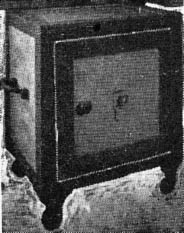
PEDDECORD'S SAFE For the first twenty-three years of the history
of the city, Decatur managed to get along without a bank, and
probably, especially in the first few years, the lack of such an
institution was scarcely felt. But eventually there came a
time when people began accumulating some money, and began to weigh
the question as to where to place it for safe keeping. The fact
that they began bringing their money to J. J. Peddecord to
hold for them was a tribute to the man. Evidently he was the
one in whom they had the most confidence. He had started in
business in Decatur as a storekeeper but he became a banker just as
a matter of accommodation to his friends. The new bank,
filling a need in the city, was so successful that finally in 1855,
Mr. Peddecord gave up the store to devote his entire time to
banking.
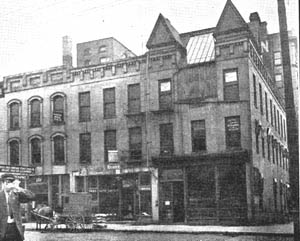
PEDDECORD & BURROWS BANK When Mr. Peddecord first began
keeping money for his customers, he placed it in an envelope or
other wrapping and laid it in a drawer with the owner's name on it.
When it began accumulating, he bought a safe. One day Mr.
Peddecord decided to count the money which had been entrusted to
him and he was astonished to find he had $20,000. A checking
system was established then, and Mr. Peddecord and his
partner, L. L. Burrows, became the banking firm of
Peddecord and Burrows, which continued in business for
sixty years. The first place of business of Peddecord &
Burrows, as bankers exclusively, was in a second story room on
Water street. In 1858 they moved to a ground floor room on
South Park street. In 1878 they began occupying the room at
the corner of South Park and Water streets, where they remained for
years. On that corner the business still exists, the bank
having been merged with the National Bank of Decatur which erected a
new building on the site.
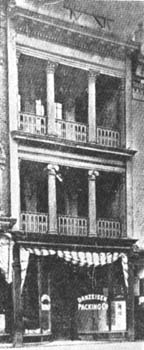
FIRST HOME OF MILLIKIN BANK Few changes were made in the firm during
its long stay in the Decatur business world. In 1857 William
Martin became a member, and the name became Peddecord,
Burrows and Martin. Mr. Martin retired in
1859, and the firm again was Peddecord and Burrows.
In 1878 William Boyd entered the company and the firm became
Peddecord, Burrows and Company. Mr. Boyd
passed away in 1889. No change was made, however, in the name
until after the death of Mr. Peddecord in 1899. From
that time on the bank was known as the L. Burrows & Co. bank.
Mr. Burrows died in 1910 and two years later the bank was
merged with the National Bank of Decatur.
MILLIKIN BANK James
Millkin, founder of the Millikin bank, began business in
Decatur as a banker in 1860. He had the courage to make the
start at rather a discouraging time and in a rather discouraging
place, and though in the first twenty years the bank went through
trying times it gradually grew until it has become one of the
strongest institutions of the kind in the state. It was just
a week after the failure of the Railroad bank that Mr. Millikin
started his banking business. Not only that, but he occupied
the same room on Merchant street that had been occupied by the
Railroad bank. Through the failure of that bank many people had
lost money and their confidence in banks in general was considerably
shaken.
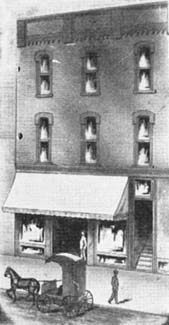
SECOND HOME OF MILLIKIN BANK Mr. Millikin in 1863 took in
as partner J. Q. A. Odor, and the firm name was Millikin
& Odor. Mr. Odor remained only a short time, however.
In 1865 Jerome R. Gorin went into partnership with Mr.
Millikin and the firm was known as James Millikin and Co.
Though others entered the firm later, the business was conducted
under that name until 1897 when it became the Millikin
National Bank.
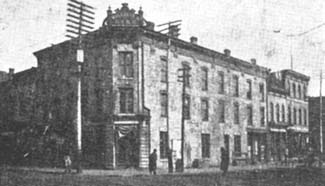
THIRD HOME OF MILLIKIN BANK Jerome R. Gorin remained with
the Millikin bank until 1881, when he withdrew to start a new
bank, and his son, O. B. Gorin then became a partner. Milton
Johnson, Parke Hammer and J. M. Brownback were others who acquired
interests in the bank before 1897. The bank has been placed in the
semi-public position in the community through the will of Mr.
Millikin, who passed away in 1909. Income from his estate,
which owns more than one-half of the stock of the bank, is to be
used "for charitable and educational purposes in Decatur". After three years in the merchant
street location the bank moved to the North side of East Main
street, east of the Morehouse & Wells store, where it
carried on business until 1880. Its third home was on the
corner of East Main and Water. There it has remained till now.
Temporary quarters were twice used while building was going on.
The present building was erected in 1895.
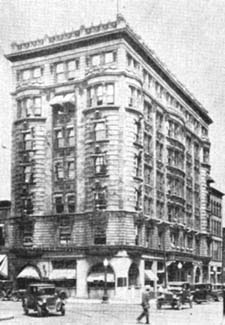
MILLIKIN BANK TODAY OTHER BANKS The
National Bank of Decatur was started in 1873 as the Decatur National
bank with a capital stock of $100,000. In 1893 it was
reorganized as the National Bank of Decatur, Robert G. Hervey
was the bank's first president.
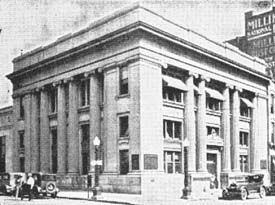
NATIONAL BANK OF DECATUR For years this bank
was located at the northwest corner of Prairie and Water streets,
but in 1914 the bank moved into its beautiful new building which it
had erected at the corner of South Park and Water streets.
As stated before the L. Burrows & Co. bank was merged with
the National Bank of Decatur in 1912. In 1881, a
private banking business was established by Gorin & Bills
and in 1883 it was reorganized as the Gorin, Dawson &
Company, the firm consisting of J. R. Gorin, J. A. Dawson
and Lewis B. Casner. They secured a room in Central
block, where they were located for a time, and then moved to the new
building they had erected at the corner of East Prairie and Merchant
streets. The business was sold to L. B. Casner and in
1891 merged with the new Citizens National bank, of which Mr.
Gorin was incorporator and first president. This bank has
been located since 1910 at the corner of North Park and Water
streets, occupying part of the five story building erected by the
bank.
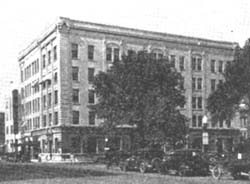
CITIZENS NATIONAL BANK In 1929 the Citizens bank
bought out the business of the Decatur State bank, which had been
organized in 1920 by J. L. Burtschi. During the period
of hits existence the Decatur State bank was located on South Park
street. Decatur has had other banks with careers of
varying lengths but which failed to survive. Back in
early '50s there was a bank on North Franklin street, David Kline
being president and Charles Fuller cashier. It later
became Fuller & Hatch and moved to the 100 block East
Main street. The Railroad bank, located on Merchant
street, was incorporated April 20, 1854, with capital stock of
$500,000. It flourished for several years, but failed in 1860.
Incorporators were Peter D. Kline of Middlesex, N. J., and M.
K. H. Reed of Sangamon county. Its president was Thomas
Lewis and cashier S. D. Ayers. Merchant
street became known as Bank avenue, because of the location of this
bank on that street at the time it was laid out.
Another early bank was the First National, started in 1866, at Water
street and the New Square. T. O. Smith was president,
John R. Race vice president, and Theo. W. Freese
cashier. Mention of this bank explains why there is
no First National bank in Decatur today. The early bank which
used that name became insolvent in 1870, and it was inexpedient for
later banks to use the name of the defunct bank. In
1870 William L. Hammer organized the banking company of
Smiths, Hammer and Company. T. O. and E. O.
Smith were the other members of the firm. They succeeded
to the business which had been done by the First National bank,
which failed about the time the new bank was organized. The
bank was located in the room occupied afterwards by the Burrows
bank. When the Smiths withdrew, their interest was taken by
James C. Rucker and J. Q. A. Odor, and the firm became
Rucker, Hammer & Co. The business continued until 1877.
The Farmers Bank was organized in July, 1893, by L. B. Casner,
L. E. Eyman and B. K. Durfee. It remained in
business about five years. Decatur's most recent and
most sensational bank failure was that of the Farmers State Bank and
Trust company, in 1925. This bank had been organized in 1913
as the Farmers and Merchants State bank. The business
flourished for a time, but was brought to an abrupt end when the
suicide of the cashier revealed a shortage of thousands of dollars
in securities.
<PREVIOUS> <NEXT>
<CLICK
HERE TO RETURN TO TABLE OF CONTENTS>
|